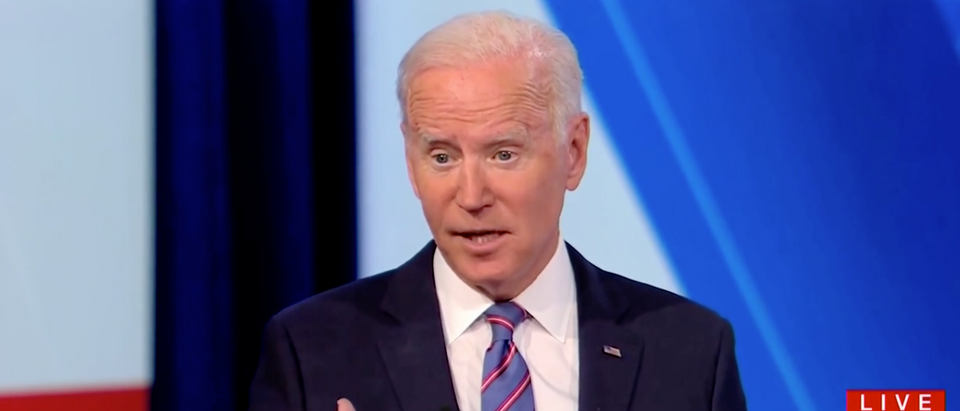There are two fundamental problems with President Biden’s “Build Back Better” legislation. One problem is its cost. The second problem is its scope.
This Democratic leftist wish list, the brainchild of self-described democratic socialist Sen. Bernie Sanders, began as a $6 trillion spending spree. Then the price tag dropped to $3.5 trillion over 10 years, which the nonpartisan, highly respected Committee for a Responsible Federal Budget estimated was really $5 trillion when the accounting “gimmicks” were considered.
Democratic West Virginia Sen. Joe Manchin announced a red line: given our massive national debt and recent multi-trillion-dollar spending to address the coronavirus pandemic, he could support only $1.5 trillion. He urged that Democrats first determine their priorities and then calculate the spending needed to achieve their programmatic goals.
Manchin’s approach can immediately be appreciated by every American who has ever gone grocery shopping. Most people make a list of what they need from the store before they leave home. They usually don’t start out thinking: “OK. This week I want to spend $212 at Safeway.” They may certainly be operating within budget constraints, but the process usually starts with a “needs assessment” followed by costing out those needs, and, finally, determining what needs they can afford on their weekly or monthly budget.
When it comes to Build Back Better, the approach has been more like a child’s Santa Claus list without considering priorities or what the nation can afford given our current debt situation.
As to the legislation’s scope, proponents and opponents agree that the proposals represent the biggest government expansion since Lyndon Johnson’s Great Society programs of the 1960s. If President Bill Clinton once remarked that the “era of big government is over,” for Joe Biden it’s evident that the era of big government is back.
The problem with Biden’s new emphasis on expanded government is that it comes against a backdrop of repeated government shortcomings at home and abroad:
- rising urban and suburban crime rates,
- an out-of-control southern border,
- the largest inflation increases in recent decades,
- uncertainty as to when the COVID-19 virus will ultimately be controlled,
- flaring tempers and uncertainty over implementing vaccine mandates in the public and private sectors,
- growing turmoil in our public-education institutions surrounding the role of parents, plus race and gender concerns,
- a disastrous Afghanistan withdrawal that included a tragically misdirected drone strike, and
- uncertainty about how to address external threats from nations such as China, Iran, North Korea, and Russia.
The one major recent government success has been the warp-speed development and rollout of several coronavirus vaccines. The Trump administration gets credit for launching the research-and-development phase, while the Biden administration gets credit for getting vaccines into most Americans’ arms.
Other than the vaccines, there’s little to show since the 2020 election that would justify a massive expansion of the federal government at a time when the country is, literally, roughly evenly divided in the U.S. House and Senate.
Recent polling also suggests that Americans are skeptical about expanding the federal government’s role in their lives.
The Biden administration’s Build Back Better communications strategy has been part of the problem. The messaging has focused on the overall cost rather than the benefits to be conveyed.
There’s actually an excellent case to be made for high-quality, universal pre-K investments that are targeted and means-tested. Economists like Nobel laureate James Heckman at the University of Chicago have calculated the significant return on every dollar invested in such high-quality pre-K programs – but you’d never know it from the Biden administration’s marketing.
While Democrats are now frantic to pass something — anything — before next month’s gubernatorial elections in New Jersey and Virginia, the fact is that passage even tomorrow will have zero impact on Americans for many months, if not until well after next year’s Congressional midterm elections.
The Biden team needs to justify why more government is needed now when the American public is increasingly skeptical about government. Slowing the process, teasing out individual programs, and explaining their benefits makes far more sense. But that’s not how this legislative sausage-making is likely to proceed.
Senator Manchin was correct: let’s slow down this legislative package for six months and see early next year what the economic environment looks like in terms of the budget deficit, the national debt, unemployment, and inflation.
Sound policymaking, however, may well be overtaken by misguided perceptions driven by today’s political expediency.
Charles Kolb served as Deputy Assistant to the President for Domestic Policy from 1990-1992 in the George H.W. Bush White House


